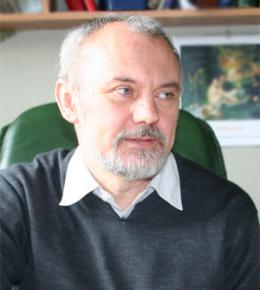Laboratory of Viral RNA Biochemistry

Alexander B. Chetverin
Ph.D. 1985, D.Sc. 1995.
Professor of Molecular Biology.
Corresponding Member of the Russian Academy of Sciences 1997.
Group Leader at the Institute of Protein Research 1986.
Head of the Laboratory 1998.
Our research projects are based on the discovery of RNA recombination in prokaryotic systems and on the invention of the molecular technique (MCT), made in this laboratory in 1988 and 1991, respectively.
MCT comprises the amplification of nucleic acids in immobilized media, such as in a gel. Since the gel matrix prevents convection of the entrapped liquid and restricts diffusion of nucleic acids, the amplification products do not spread throughout the medium. Rather, they form more or less compact molecular colonies, which are reminiscent of bacterial colonies growing on the surface of a nutrient agar. If amplification is carried out in a thin gel layer, a 2-D pattern of molecular colonies is generated, each colony comprising many copies (a clone) of a single starting RNA or DNA template molecule.
MCT allowed us to detect the source of template molecules in the so-called “template-free” RNA synthesis performed by Qβ replicase (RNA-directed RNA polymerase of phage Qβ) in cell-free system, and permitted very rare reactions of recombinations between RNA molecules to be studies in vitro, which resulted in the discovery of the ability of RNA molecules to spontaneously rearrange their sequences under physiological conditions. A variety of practical applications of MCT were also developed, including cell-free gene cloning and screening, and digital assays that provides for a reliable detection of one DNA target molecule and two RNA molecules in 100-ml aliquots of the whole blood, which is the highest sensitivity ever achieved in molecular diagnostics.
